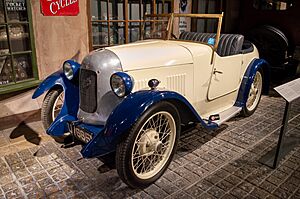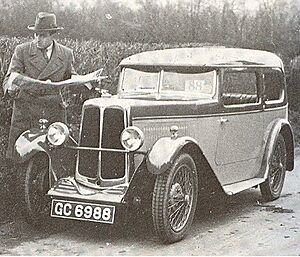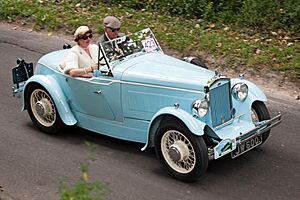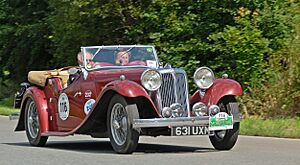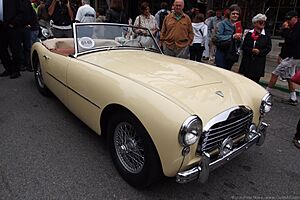Swallow Sidecar Company facts for kids
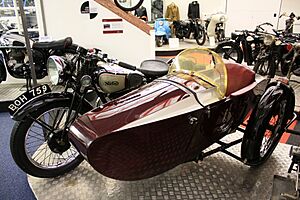
A 1935 Sidecar and a Norton Model 18 at the Coventry Transport Museum
|
|
|
Trade name
|
|
|---|---|
| Industry | Motor vehicle bodies |
| Fate | Walmsley & Lyons sold to Swallow Coachbuilding Company Limited |
| Successor | Swallow Coachbuilding Company Limited |
| Founded | 2 September 1922 in Blackpool, England |
| Founders | William Walmsley and William Lyons |
| Defunct | 30 September 1930 |
| Headquarters |
Blackpool, then Coventry
,
England
|
| Products | Sidecars and car bodies |
| Brands | Swallow |
| Owners | William Walmsley and William Lyons |
Swallow Sidecar Company was the first name for a British company started by two friends, William Walmsley and William Lyons. They built sidecars for motorcycles and later made bodies for cars. Their business began in Blackpool, England, and later moved to Coventry.
This company eventually grew into the famous Jaguar Cars Limited. The part of the business that made sidecars was sold in 1946 to a different company called Helliwell Group.
Contents
How Two Friends Started a Business
The company was founded by two friends, William Walmsley (who was 30) and William Lyons (who was 20). They made their partnership official on William Lyons' 21st birthday, September 4, 1922. Both families lived on the same street in Blackpool, England.
Before they teamed up, Walmsley was already building sidecars and attaching them to motorcycles he had fixed up. Lyons had learned about cars by working at Crossley Motors and later as a salesman for a Sunbeam dealer.
Their business used three different names over time: Swallow Sidecar Company, Swallow Sidecar and Coachbuilding Company, and Swallow Coachbuilding Company. In 1930, they created a formal company to own their growing business.
Making Sidecars: The Beginning
The First Swallow Sidecars
William Lyons saw that Walmsley's sidecars could be a big hit. So, they decided to work together. They found a place in Blackpool and got a £1,000 bank loan with help from their fathers.
With a small team, they started making motorcycle sidecars. Soon, they needed more space and rented another building nearby. Walmsley's father then bought a large building for them in Cocker Street, Blackpool. With this extra room, they started offering to repair and paint cars. They also fitted new roofs and seats for cars. This led them to add "Coachbuilding" to their company name.
Building Car Bodies
Swallow Sidecar and Coachbuilding Company
The first car Lyons and Walmsley wanted to build bodies for was the Austin 7. This was a very popular and affordable car. For their first display car, they got an Austin 7 chassis from a dealer.
Lyons drew what he wanted, and a coachbuilder named Cyril Holland created a unique, open two-seater body. It had a special hardtop roof with a distinct back window. This new car, called the Austin Seven Swallow, was shown to the public in May 1927.
Austin approved the Swallow bodywork after a few small changes were made. The car was then shown to Henlys, a car dealer in London, who ordered 500 cars. These included both two-seaters and saloons (closed cars).
The Swallow car cost only £175. It was very popular because of its bright two-tone colors and stylish look, which copied more expensive cars. This was especially true during the good times of the late 1920s and even during the difficult years that followed. Soon after, a saloon version, the Austin Seven Swallow Saloon, was also made.
Swallow Coachbuilding Company
During 1927, the word "Sidecar" was removed from the company name. It became simply the Swallow Coachbuilding Company.
Moving to Coventry
Because more and more people wanted Swallow cars, the company needed to move closer to where most British car factories were. So, in 1928, they moved to a former factory in Holbrook Lane, Coventry.
Their business kept growing. In 1929, the owners felt confident enough to have their own display at the important London Motor Show.
In 1929, three new Swallow car models appeared. These were built on chassis (the car's frame) from Standard, Swift, and Fiat. Also in 1929, John Black and William Lyons created a special sports car. This "First" SS (Standard Swallow) was a sleek, fast-looking car. It showed they wanted to make very quick cars, possibly for racing. This car is thought to have been sent to Australia in the late 1940s.
Swallow Coachbuilding Company Limited
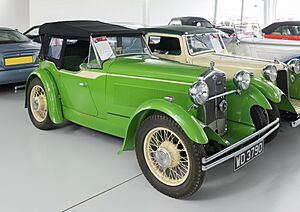
A 1932 Swallow car body at the British Motor Museum
|
|
| Industry | Motor vehicle bodies |
|---|---|
| Fate | Sold to S.S. Cars Limited in 1934 |
| Predecessor | Walmsley & Lyons trading as Swallow Coachbuilding Company |
| Successor | S.S. Cars Limited |
| Founded | Coventry, England (1 October 1930) |
| Founders | William Walmsley and William Lyons |
| Defunct | 1 August 1934 |
| Headquarters |
Coventry
,
England
|
|
Key people
|
William Walmsley and William Lyons |
| Products | Sidecars and car bodies |
| Brands | Swallow |
| Owners | William Walmsley and William Lyons |
The Wolseley Hornet
Swallow started making bodies for the Wolseley Hornet car. These were the first Swallow cars with 6-cylinder engines. Production began in January 1931 with an open 2-seater car. A 4-seater car followed later that year.
In April 1932, new "Special" Hornet chassis arrived, and these cars became very popular. They were the last of the special-bodied Swallow cars. Their production stopped in the summer of 1933. They were replaced by the new SS 1 tourer car.
The advertising slogan for the Wolseley Hornet-Swallow cars was: "The Swallow touch that means so much".
The SS One Car
Engines and chassis were provided by the Standard Motor Company. Swallow then added bodies designed under William Lyons' guidance. The first cars in the SS range available to the public were the 1932 SS 1 and SS 2. The SS 1 had a 2-litre or 2½-litre six-cylinder engine. The SS 2 had a smaller four-cylinder 1-litre engine.
At first, these cars were available as a coupé (a two-door car) or a tourer (an open car). A saloon (a closed car) was added in 1934. The success of these new cars led to some big changes. William Walmsley decided to leave the business. To replace his money, new investors were brought in. A brand-new company, S. S. Cars Limited, was formed. This new company officially started business on February 1, 1934.
What Happened After Swallow
SS Cars Limited
The SS Jaguar cars became very successful and the company grew a lot. Especially popular were the sports and saloon cars released in late 1935. This success led to a new name for the company.
Jaguar Cars Limited
Towards the end of World War II, on March 23, 1945, the owners of SS Cars Limited agreed to change the company's name to Jaguar Cars Limited. William Lyons, the chairman, said that "Jaguar" was a unique name and could not be confused with any foreign names.
The sidecar part of the business was now run by a different company, Swallow Coachbuilding Co. (1935) Ltd.
Helliwell Takes Over Sidecars
In January 1946, the Helliwell Group bought Swallow Coachbuilding Company (1935) Limited from Jaguar Cars Limited. Helliwell was a company that fixed aircraft. The sidecars made at Helliwell's factory were built just like the originals and used the same special trademark. The sidecar business finally closed down in the late 1950s.
 | Frances Mary Albrier |
 | Whitney Young |
 | Muhammad Ali |


